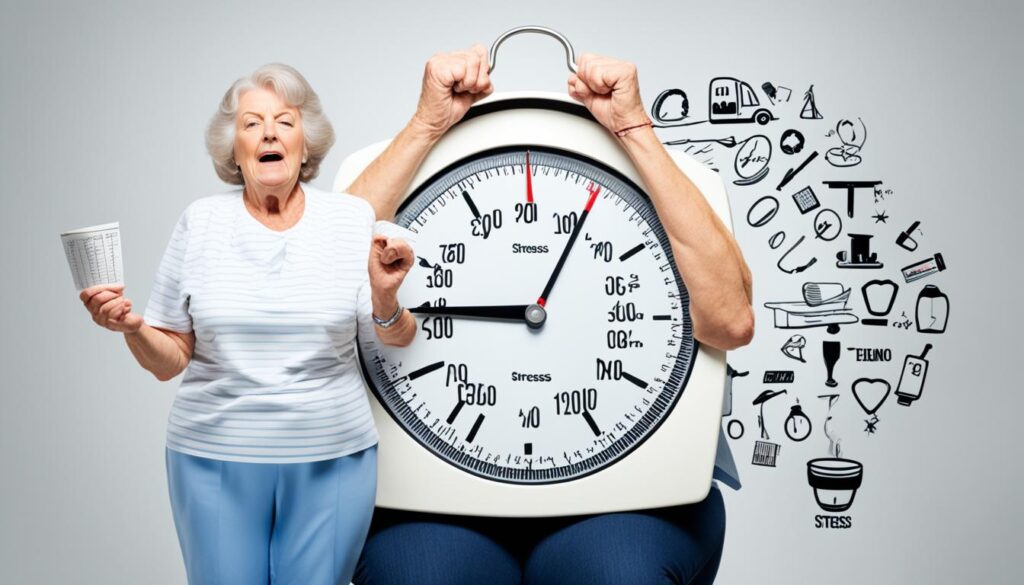Are you a senior struggling to shed those unwanted pounds? You’re not alone. As we age, our bodies undergo significant changes that can make weight loss more challenging. But don’t let that discourage you – with the right strategies, you can achieve your weight loss goals and improve your overall health and well-being1.
Key Takeaways
- Understand the unique factors that impact weight loss for seniors, including slower metabolism, hormonal changes, and lifestyle shifts.
- Adopt effective strategies like consuming high-protein diets, staying hydrated, and incorporating strength training to support weight loss over 60.
- Avoid processed foods, sugary beverages, and excessive alcohol, which can hinder weight loss efforts.
- Manage stress and get enough sleep to support a healthy metabolism and prevent emotional eating.
- Focus on nutrient-rich foods and consult your doctor for a personalized weight loss plan.
The journey to effective weight loss over 60 may seem daunting, but with the right mindset and a tailored approach, you can achieve your goals and enjoy a healthier, more active lifestyle. Let’s explore the strategies that can help you succeed1.
The Challenges of Weight Loss After 60
Maintaining a healthy weight can become increasingly challenging as we age. Weight loss struggles over 60 are common, and this is largely due to the natural changes that occur in our bodies as we get older2.
Hormones and Metabolism
As we age, our metabolism naturally slows down. This is partly because we tend to lose muscle mass, which burns more calories than fat3. Additionally, hormonal changes can play a significant role in weight gain. For men, testosterone levels drop about 1 to 2 percent per year starting around age 403. For women, the hormonal fluctuations during perimenopause and menopause can further slow metabolism and contribute to age-related weight gain, even without changes in diet or exercise3.
Menopause and Perimenopause
The hormonal changes that occur during menopause, which typically happens between ages 45 and 55, can lead to an average weight gain of about five pounds3. This is due to the decline in estrogen and other hormones that can affect metabolism and body fat distribution3. Perimenopause, the transition period leading up to menopause, can also trigger hormonal changes that make it harder to lose weight3.
| Factors Affecting Weight Loss After 60 | Impact |
|---|---|
| Decreased muscle mass | Reduced calorie burning and slower metabolism3 |
| Hormonal changes (e.g., declining testosterone, estrogen fluctuations) | Slower metabolism and increased fat storage3 |
| Menopause and perimenopause | Average weight gain of 5 pounds3 |
| Medications for common health conditions | Can interfere with weight loss efforts by affecting metabolism or appetite |
Medications used to manage common health conditions in older adults, such as diabetes or high blood pressure, can also interfere with weight loss efforts by affecting metabolism or appetite.
“Implementing strategies such as focusing on healthy foods, downsizing portions, staying hydrated, managing stress, engaging in strength training, regular aerobic exercise, and ensuring sufficient sleep can aid in weight management for seniors.”3
Increased Free Time and Lifestyle Changes
The transition to retirement can present both challenges and opportunities when it comes to weight loss. With more free time on their hands, some older adults become more sedentary, engaging in less incidental physical activity throughout the day2. This reduced movement can lead to a slowdown in calorie burn4. Additionally, retirees may find themselves spending more time socializing, which can translate to increased opportunities for eating and drinking, potentially leading to weight gain5.
However, the extra free time in retirement can also allow for more structured exercise and meal planning, which can support weight loss efforts4. Retirees may have the flexibility to incorporate regular physical activity into their daily routines, such as taking brisk walks, participating in senior fitness classes, or engaging in strength training exercises4. Additionally, the increased free time can enable retirees to plan and prepare more nutritious meals at home, helping them maintain a balanced diet and better manage their caloric intake.
To effectively manage weight during retirement, it’s crucial for older adults to be mindful of their lifestyle changes and make conscious efforts to stay active and maintain healthy eating habits4. By embracing the opportunities presented by increased free time and proactively addressing the potential challenges of a more sedentary retirement lifestyle, retirees can achieve their weight loss goals and enjoy a healthier, more active retirement245.
Health Conditions Affecting Weight Loss
As people age, they can become more susceptible to various health conditions that can complicate weight loss efforts6. Unintentional weight loss is concerning if you lose 5% or more of your body weight every 6-12 months6. Understanding the underlying health issues that can contribute to weight gain or loss is crucial for successful weight management over 60.
Thyroid and Insulin Issues
Thyroid disorders, such as hypothyroidism, can slow metabolism and make it harder to lose weight7. Hyperthyroidism, cancer, Alzheimer’s or dementia, gastrointestinal issues, diabetes, and heart disease are common conditions that may lead to sudden weight loss in seniors7. Similarly, insulin resistance and type 2 diabetes can interfere with the body’s ability to regulate blood sugar and metabolism, leading to weight gain.
Consulting a doctor and properly managing any underlying health issues is crucial for successful weight loss over 607. Proper diagnosis and treatment are necessary to address unexplained weight loss in seniors, including physical exams, diagnostic tests, and referrals to specialists if needed7.
By understanding and addressing these health challenges, individuals can take a proactive approach to managing their weight and improving their overall well-being in their golden years6. A healthy diet can prevent health problems and keep individuals looking younger6.
Keep Exercising for Effective Weight Loss Over 60
Maintaining a regular exercise routine is a crucial component of successful weight loss for older adults. As the body’s metabolism naturally slows down with age, exercise for seniors and senior-friendly workouts become even more important to support the importance of physical activity for older adults8.
The National Institutes of Health recommends that older adults aim for at least 150 minutes of moderate physical activity per week9. This can include activities such as swimming, cycling, and power walking, which are gentle on the joints while still providing cardiovascular benefits and calorie-burning potential8.
Strength training is also essential for preserving muscle mass and boosting metabolism9. By staying physically active, older adults can offset the natural decline in metabolism and support their weight loss goals8.
“Weight loss affected lean mass, strength, bone density, and aerobic capacity positively.”8
Research has shown that exercise can have a significant impact on appetite control and energy balance8. Furthermore, the Centers for Disease Control and Prevention (CDC) data highlights the importance of physical activity in managing health conditions like diabetes8.
Healthcare providers also play a crucial role in encouraging older adults to stay physically active as part of a comprehensive care plan8. By incorporating senior-friendly workouts and prioritizing the importance of physical activity for older adults, older individuals can achieve effective and sustainable weight loss over 60.

Eat Smaller Meals More Frequently
As we age, our metabolism tends to slow down, making it more challenging to maintain or lose weight10. One effective strategy to combat this is to eat smaller, more frequent meals throughout the day rather than larger, less frequent ones. This approach can help prevent feelings of hunger and overeating while still reducing the overall calorie intake10.
According to the author’s experience, eating six smaller meals a day helped to manage hunger and reduced cravings, resulting in feeling less hungry overall11. The author lost 2 pounds by following the routine of eating smaller meals more frequently11. The author also felt an increase in energy levels after adopting the practice of having six meals a day, which also encouraged some physical activity like quick yoga sessions and playing with family11.
However, it’s important to find the optimal number of meals that works best for each individual. The author noted that transitioning from six meals a day to four meals per day was more manageable for them, indicating that finding the appropriate meal frequency is crucial for personal success11.
Older adults should work closely with their healthcare providers to determine the appropriate number of calories and meal frequency to support their weight loss goals10. Clinical nutrition guidelines recommend six to ten meals per day for patients battling diseases like pancreatitis and gastroparesis, or undergoing chemotherapy for appetite suppression10. Conversely, grazing post-surgery for gastrointestinal procedures like bariatric surgery may lead to adverse health outcomes, such as less weight loss and eventual weight regain10.
Portion control is also essential for successful weight loss, especially for seniors12. Research has shown that people almost always eat more food when offered larger portions12. Appropriate portion control is crucial for weight loss and weight management12. By understanding the recommended serving sizes for different food groups, older adults can better manage their calorie intake and support their weight loss efforts.
| Food Group | Recommended Serving Size | Calories per Serving |
|---|---|---|
| Vegetables | 1 medium pepper, 1/2 cup cooked carrots | 25 calories |
| Fruits | 1 tennis ball-sized fruit | N/A |
| Carbohydrates | 1 deck of cards | 70 calories |
| Protein | 1 deck of cards | 110 calories |
| Fats | 2 dice-sized servings | 45 calories |
By incorporating smaller, more frequent meals and paying attention to portion sizes, older adults can effectively support their weight loss goals and maintain a healthy lifestyle101112.
Stay Hydrated to Support Weight Loss
Maintaining proper hydration can play a significant role in weight loss efforts for older adults. Research shows that drinking water can stimulate the metabolism and help prevent dehydration, which can sometimes be mistaken for hunger13. Seniors should aim to drink at least 64 ounces of water per day, and can also get hydration from water-rich foods like fruits and vegetables14.
Dehydration can have a negative impact on the body’s weight loss processes. Slight dehydration may decrease lipolysis, the process of burning fat for energy13, and can also be linked to increased cortisol production, the stress hormone13. Dehydration can also lead to urinary tract infections, which affect a significant portion of older adults, and incontinence, which may further reduce water intake14.
Drinking water before meals can help with weight loss by reducing calorie intake. A small 2016 study found that people who drank two glasses of water before a meal ate 22% less than those who did not13. Additionally, replacing high-calorie beverages like juice, soda, or sweetened drinks with water can save significant calories13. Overweight and obese women who replaced diet beverages with water after meals showed greater weight reduction during a weight-loss program13.
Staying hydrated can also boost the body’s metabolism. A small 2003 study found that drinking about two cups of water at 71°F led to a 30% average increase in metabolic rates of 14 healthy adults13. Furthermore, in an eight-week study, 50 girls with excess weight who drank about two cups of water before meals without additional dietary changes saw weight loss and reductions in body mass index and body composition scores13.
Proper hydration is essential for overall health and can support the body’s natural weight loss processes. By staying well-hydrated, seniors can improve their metabolic efficiency, prevent dehydration-related issues, and feel more satisfied between meals, all of which can contribute to successful weight loss over 60131415.
“Drinking water is one of the simplest and most effective ways to support weight loss, especially for older adults.”
Cut Carbs and Sugars for Better Nutrition
As people age, their bodies require fewer calories but more nutrients16. This makes it important for older adults to focus on consuming nutrient-rich, whole foods rather than empty calories from added sugars and refined carbohydrates16. Limiting intake of sweets, baked goods, and other processed foods high in sugar and refined carbs can help create a calorie deficit to support weight loss16. Instead, seniors should emphasize fruits, vegetables, whole grains, lean proteins, and healthy fats to ensure they get the essential nutrients their bodies need.
A typical low-carb diet usually contains less than 26% of total daily calories from carbs17. For those following a 2000-calorie diet, this equals fewer than 130 grams (g) of carbs per day17. The Ketogenic (keto) diet limits daily carb intake to less than 5-10% of total calories, or around 20–50 g of carbs17. The Atkins diet restricts carb intake to about 20 g per day during the first phase, gradually increasing but typically not exceeding 100 g per day17.
The Atkins Diet starts with a very low-carbohydrate eating plan where individuals consume only about 10% of their daily calories from carbohydrates18. During the Induction phase, individuals intake just 20 grams of net carbs a day, primarily from vegetables18. The balancing phase follows Induction, where individuals continue consuming a minimum of 12 to 15 grams of net carbs from foundation vegetables18.
| Meal Plan | Total Carb Intake (grams) | Breakfast (grams) | Lunch (grams) | Dinner (grams) |
|---|---|---|---|---|
| Day 1 | 62 | 36.5 | 17 | 8.5 |
| Day 2 | 40.6 | 19.4 | 13.5 | 7.7 |
| Day 3 | 54.7 | 19 | 10.5 | 25.2 |
By limiting refined carbs and sugars, older adults can focus on consuming more nutrient-dense foods that provide the essential vitamins, minerals, and antioxidants their bodies need to maintain health and support weight loss16. This strategy can help seniors meet their nutritional needs while creating a calorie deficit for effective weight loss over 60.
“Limiting carbohydrates in the long term on a low-carb diet might increase the risk of having too little of some vitamins or minerals and digestive problems.”16
It’s important for older adults to work with their healthcare provider to develop a personalized plan that balances carb reduction with adequate nutrient intake to support their overall health and weight loss goals.
Manage Stress and Sleep for Weight Loss Over 60
Achieving weight loss after 60 can be challenging, but managing stress and prioritizing quality sleep are crucial steps. Chronic stress can lead to increased cortisol levels, which may promote weight gain, especially around the midsection19. Stress can also trigger emotional eating, causing seniors to consume more calories than they need19. Additionally, lack of quality sleep has been linked to metabolic changes that make weight loss more difficult20.
Stress and Emotional Eating
Stress can have a significant impact on weight loss efforts for older adults. When individuals experience high levels of stress, they may turn to emotional eating as a coping mechanism19. This can lead to consuming calorie-dense foods, which can sabotage weight loss goals19. Seniors should prioritize stress management techniques, such as meditation, yoga, or counseling, to help regulate their emotions and prevent emotional eating21.
Furthermore, stress can lead to missed meals and poor food choices, which can impact weight in diverse ways21. Doctors should be consulted if losing weight unintentionally, experiencing chronic headaches, chest pain, persistent anxiety, or resorting to substance abuse to cope with stress21.
- Practice stress management techniques, such as meditation, yoga, or counseling, to regulate emotions and prevent emotional eating21.
- Aim for 7-9 hours of quality sleep per night to support weight loss and overall health20.
- Consider mixing up your exercise routine by trying more than one activity, such as walking one day and biking the next20.
By managing stress and improving sleep quality, seniors can create a supportive environment for effective weight loss over 6020. Prioritizing these aspects of overall well-being can lead to improved metabolic function, reduced cravings, and increased energy levels19.

“Stress can have a significant impact on weight loss efforts for older adults. When individuals experience high levels of stress, they may turn to emotional eating as a coping mechanism.”
| Stress Management Techniques | Benefits for Weight Loss Over 60 |
|---|---|
| Meditation | Reduces cortisol levels, regulates emotions, and prevents emotional eating |
| Yoga | Improves stress management, promotes relaxation, and boosts mood |
| Counseling | Provides coping strategies for managing stress and emotional eating |
Focus on Nutrient-Rich Foods
When aiming to shed excess pounds after 60, it’s crucial to emphasize nutrient-dense, whole foods rather than empty calories from processed or sugary items22. This means prioritizing a balanced diet rich in fruits, vegetables, whole grains, lean proteins, and healthy fats. These nutrient-rich foods not only provide essential vitamins and minerals, but they also tend to be more filling and satisfying, helping reduce overall calorie intake23. By focusing on a nutrient-dense eating plan, older adults can support their weight loss efforts while also improving their overall health and well-being.
The Mediterranean diet, for example, is associated with lower cognitive decline and reduced risk of Alzheimer’s disease22. This eating pattern emphasizes nutrient-dense foods like fish, shellfish, nuts, avocados, leafy greens, berries, eggs, and dark chocolate22. Incorporating these nutrient-rich items into your daily meals can be an effective strategy for achieving and maintaining a healthy weight in retirement.
To support your weight loss goals, consider consulting with a registered dietitian who can provide personalized meal plans tailored to your specific needs and preferences22. These meal plans may include a range of calorie levels, from 1,200 to 2,000 per day, with detailed nutritional breakdowns to ensure you’re meeting your body’s requirements for essential vitamins, minerals, protein, carbohydrates, fiber, and sodium22. With the guidance of a professional, you can make sustainable changes to your eating habits and enjoy the benefits of a nutrient-dense diet for weight loss and overall well-being.
“Consuming a balanced, nutrient-rich diet is key to successful weight loss and improved health in older adults. By focusing on whole, unprocessed foods, you can fuel your body with the essential nutrients it needs while also supporting your weight loss goals.”
Remember, as you get older, your body’s nutritional needs may change23. Older adults often have the highest diet quality compared to other age ranges, with a Healthy Eating Index (HEI) score of 63 out of 10023. However, they may also face challenges in meeting certain nutrient requirements, such as adequate protein and hydration23. By being mindful of your individual needs and making adjustments to your diet, you can ensure you’re getting the nutrients your body requires to thrive during this stage of life.
| Nutrient | Recommended Daily Allowance (RDA) for Adults Over 50 |
|---|---|
| Protein | 0.5–0.9 grams per pound (1.2–2.0 grams per kg) of body weight24 |
| Fiber | 25 grams for women, 38 grams for men24 |
| Calcium | 1,200 mg per day for postmenopausal women, 1,000 mg per day for other populations24 |
| Vitamin D | 600 IU or greater, with higher doses based on personal needs24 |
| Omega-3 (ALA) | 1.1 grams per day for women, 1.6 grams per day for men24 |
| Vitamin B12 | 2.4 mcg per day24 |
| Potassium | 2,600 mg for women, 3,400 mg for men24 |
By incorporating these nutrient-dense foods and adhering to the recommended daily allowances, older adults can support their weight loss efforts while also promoting overall health and well-being24. Additionally, choosing water as the main beverage can help lower the intake of simple sugars and “empty calories.”24
Consult Your Doctor for a Tailored Plan
When it comes to losing weight over 60, working closely with your healthcare provider is crucial25. Older adults face unique challenges and health considerations that require personalized guidance. By collaborating with a doctor, seniors can develop a tailored weight loss plan that addresses their individual needs and helps them achieve their goals safely and effectively.
Healthcare providers can play a vital role in the weight loss journey for older adults. They can identify any underlying medical conditions, such as thyroid or insulin issues, that may be affecting weight. Doctors can then provide personalized recommendations on the best diet, exercise, and lifestyle modifications to support safe and sustainable weight loss25. They can also monitor for any potential side effects or interactions with medications, ensuring the weight loss plan is safe and effective.
For seniors, a personalized approach to weight loss is essential26. The Duke University Health System, for example, offers a comprehensive medical weight management program that includes physical examinations, nutritional counseling, behavioral health support, and tailored exercise plans26. By collaborating with a healthcare team, older adults can develop a plan that addresses their unique needs and helps them achieve their weight loss goals.
Remember, the key to effective weight loss over 60 is not a one-size-fits-all solution27. Consulting with your doctor can help you navigate the challenges of aging and create a personalized plan that sets you up for long-term success25. With the right guidance and support, seniors can safely and effectively lose weight and improve their overall health and well-being.

“Working with a healthcare provider is essential for seniors looking to lose weight safely and effectively. They can help identify any underlying issues and provide personalized guidance to support your weight loss goals.”
The Key to Weight Loss Over 60
Weight loss after the age of 60 can certainly be more challenging, but it is far from impossible. The key to successful weight loss for seniors lies in understanding and addressing the unique obstacles that come with aging, such as slower metabolism, hormonal changes, and various health conditions28. By adopting targeted strategies, older adults can overcome these challenges and achieve their weight loss goals, ultimately improving their overall health and quality of life.
One of the primary factors that can make weight loss difficult for seniors is a slower metabolism. As people age, their basal metabolic rate naturally declines, leading to a reduced calorie-burning capacity29. Additionally, the loss of muscle mass that often accompanies aging can further contribute to a slower metabolism, as muscle tissue burns more calories than fat29. To combat this, seniors are advised to engage in regular strength training exercises to maintain and even build muscle mass, which is crucial for boosting their metabolic rate28.
Hormonal changes, particularly in women going through perimenopause and menopause, can also pose challenges for weight loss30. These hormonal shifts can slow down metabolism and lead to a redistribution of fat, often resulting in weight gain around the midsection29. To address this, seniors should focus on a balanced, nutrient-rich diet and aim to consume 1 gram of protein per kilogram of body weight to help preserve muscle mass28.
Health conditions common in older adults, such as diabetes, thyroid issues, and insulin resistance, can further complicate weight loss efforts30. Seniors should work closely with their healthcare providers to manage these conditions and develop a tailored weight loss plan that takes their unique needs into account28.
In addition to addressing physiological factors, seniors must also consider lifestyle changes that can impact weight loss. Retirement often leads to a more sedentary lifestyle, and boredom or excess free time can contribute to increased snacking and calorie intake30. To combat this, seniors should strive to stay physically active, aiming for at least 150 minutes of moderate exercise per week, as recommended by the National Institutes of Health30. They should also focus on eating smaller, more frequent meals, staying hydrated, and cutting back on carbs and sugars in favor of nutrient-dense foods2830.
By understanding the keys to successful weight loss for seniors and adopting a comprehensive approach that addresses both physiological and lifestyle factors, older adults can overcome the challenges of weight loss and achieve their goals283029. With dedication, patience, and the support of healthcare professionals, seniors can enjoy the benefits of healthy aging and improved quality of life.
“The key to weight loss over 60 is understanding the unique challenges and adopting a tailored strategy to overcome them.”
Conclusion
Losing weight after the age of 60 presents unique challenges, but it is an achievable goal for many older adults. By understanding the physiological and lifestyle changes that can make weight loss more difficult, seniors can adopt effective strategies to overcome these obstacles31. This includes regular exercise, portion control, nutrient-dense eating, proper hydration, stress management, and working closely with a healthcare provider3132. With the right approach, older adults can shed excess weight, improve their overall health, and enjoy an active, vibrant retirement.
The prevalence of obesity among older adults has doubled in the past 30 years, with an estimated prevalence of 37.45% in 201032. While successful weight loss is possible in adults aged 65 years and older32, unintentional weight loss in this age group is associated with increased morbidity and mortality33. By focusing on effective strategies for healthy weight loss, seniors can maintain their independence, reduce the risk of chronic conditions, and enhance their quality of life.
The key to successful weight loss for older adults lies in a comprehensive, personalized approach that addresses the unique challenges they face3132. By prioritizing their health, staying active, and working closely with their healthcare providers, seniors can achieve their weight loss goals and embrace the benefits of healthy aging313233.
FAQ
What are the unique challenges of weight loss over 60?
Slower metabolism, hormonal changes, and lifestyle shifts in retirement can make weight loss more difficult for older adults.
How do hormonal changes and metabolism affect weight loss after 60?
As people age, their metabolism naturally slows down, and hormonal fluctuations, such as those during perimenopause and menopause, can further contribute to weight gain.
How can the transition to retirement impact weight loss efforts?
The extra free time in retirement can lead to increased sedentary behavior and more opportunities for social eating, which can hinder weight loss efforts.
What health conditions can complicate weight loss for older adults?
Thyroid disorders, insulin resistance, and type 2 diabetes can interfere with the body’s ability to regulate metabolism and blood sugar, making weight loss more challenging.
Why is regular exercise important for weight loss over 60?
Exercise can help offset the natural decline in metabolism and preserve muscle mass, which are key for successful weight loss in older adults.
How can older adults adjust their eating habits to support weight loss?
Eating smaller, more frequent meals throughout the day can help prevent hunger and overeating, while also reducing overall calorie intake.
What is the importance of hydration for weight loss over 60?
Staying properly hydrated can stimulate the metabolism and help prevent dehydration, which can sometimes be mistaken for hunger.
How can older adults focus on nutrient-rich foods for weight loss?
Emphasizing fruits, vegetables, whole grains, lean proteins, and healthy fats can provide essential nutrients while supporting a calorie-deficit for weight loss.
How can stress and sleep quality affect weight loss efforts for seniors?
Chronic stress and poor sleep quality can lead to metabolic changes and emotional eating, which can hinder weight loss efforts for older adults.
Why is it important for older adults to work closely with a healthcare provider for weight loss?
Healthcare providers can help identify any underlying medical conditions, provide personalized guidance, and monitor for potential side effects or medication interactions to support safe and effective weight loss over 60.
Source Links
- What Is the Best Weight Loss Plan for Seniors? Diet Tips for Losing Weight
- What Your Weight in Your 60s Says About Your Health
- 5 Reasons It’s Harder to Lose Weight With Age and What to Do About It
- How To Maintain—And Even Gain—Muscle After 60
- Losing Weight After 60
- Is It Normal to Lose Weight as You Age?
- Unexplained Weight Loss in Seniors
- Role of Physical Activity for Weight Loss and Weight Maintenance
- Calculating your calories burned
- Small, Frequent Meals
- I Tried Eating 6 Meals A Day, And Here’s What Happened
- Portion control for weight loss
- Yes, drinking more water may help you lose weight
- Tips for Water Intake for Older Adults
- How Drinking More Water Can Help You Lose Weight
- Can a low-carb diet help you lose weight?
- A Low Carb Meal Plan and Menu to Improve Your Health
- Atkins Diet: What’s behind the claims?
- Tips for Losing Weight After 60 + Why It’s Hard! – Chapter
- How to Increase Energy After 60
- Stress-Related Weight Loss: 7 Reasons Why and What You Can Do
- 7-Day Meal Plan for Healthy Aging from the Inside-Out, Created by a Dietitian
- Nutrition as We Age: Healthy Eating with the Dietary Guidelines – News & Events
- The Definitive Guide to Healthy Eating in Your 50s and 60s
- Lose weight for life with the official Mayo Clinic Diet
- Lifestyle and Weight Management
- Losing Weight After 60: Best Diets for Seniors
- Tips For Losing Weight After Age 60
- Weight Loss Basics For Seniors: The SilverSneakers Guide
- Losing Weight After 60: Tips for Success & Why It’s Hard
- Weight Loss Strategies in the Elderly: A Clinical Conundrum
- Weight loss in obese adults 65 years and older: A review of the controversy
- Unintentional Weight Loss in Older Adults


